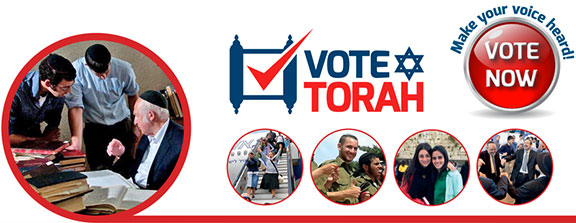The World Zionist Congress 2015 Elections
A Struggle for the Heart and Soul—and Wallet—of the Zionist Movement
By Daniel Perez
Of all the Zionist institutions in Israel or the Diaspora, few can claim the distinguished history, the influence, or the sheer numbers of HaHistadrut HaTsionit HaOlamit, better known among English-speakers as the World Zionist Organization or WZO. Founded under the leadership of Zionist visionary Theodor Herzl in 1897, the WZO oversees several components vital both to the establishment of the Jewish state and its continued prosperity, including the Jewish Agency for Israel, which deals with matters of aliyah (Jewish immigration to Israel) and Zionist education; and the Jewish National Fund, perhaps best known for its role in Israel's afforestation, one of the greatest environmental success stories of the 20thcentury.
Legislating certain aspects of these agencies' operations is the WZO's parliamentary arm, the World Zionist Congress. The World Zionist Congress, which convenes once every four or five years, is currently holding elections.
Traditionally, the American contingent of the World Zionist Congress has been dominated by parties affiliated with specific religious denominations, the Reform and Conservative movements in particular. This year's elections may indicate a departure from that status quo, as behind the scenes a battle rages for the very future of Zionism.
"There's a lot at stake here," explains Rubin Margules, president of the Zionist Organization of America's Brooklyn chapter. "The JNF owns significant tracts of Israeli land, some 13% of the country's total area. And JAFI's annual budget is nearly half a billion dollars. The World Zionist Congress has a lot of say when it comes to policy issues, and how these groups—and other WZO-affiliated institutions—spend their money."
The ZOA is one of eleven parties vying to represent American Jewry at the World Zionist Congress. (Regulations currently limit the WZC to 500 seats, with 190 allocated to Israeli delegates, 145 from the United States, and 165 from the rest of the Diaspora combined.)
The ZOA slate, running under the slogan of "Defending Jews & Israeli Rights," has dedicated itself to combating global anti-Semitism and supporting Israel as a strong, unapologetically Jewish state. Vital to this second aspect of the ZOA platform are maintaining Jerusalem as the nation's undivided capital, and ongoing support for Jewish communities in Judea & Samaria (commonly referred to throughout the media as the "West Bank"). Margules compares this stance with certain competing factions in this year's elections.
"There are, among the parties in the current WZC election, groups advocating unilateral Israeli land concessions," says Margules. "One party even supports economic warfare against Israel, openly promoting the Boycott, Divestment and Sanctions (BDS) movement on its website!"
Denouncing those Jewish groups that aid and abet efforts aimed at the public delegitimization of the Jewish state, Margules claims that these liberal activists would steer the World Zionist Congress toward policies that are ultimately detrimental to Israel's well-being. By contrast, the ZOA, which claims members from across the ethnic and denominational spectrum, presents itself as American Jewry's best defense against de facto anti-Israel organizations like J Street setting the tone for Israel-Diaspora relations. The ZOA slate itself represents a broad coalition, including leading members of such pro-Israel institutions as the One Israel Fund, Israel Bonds, watchdog groups like the Committee for Accuracy in Middle East Reporting in America (CAMERA), and the Sephardic Community Alliance, among others.
"We can't hand over control of the WJC agenda to Israel's opponents, Jewish or otherwise," declares Margules, noting that the consequences of such a change in leadership would potentially be "devastating."
The ZOA leader went on to explain that the current election could represent a tipping point in Israel activism. "The fact is that these [anti-Israel] groups don't represent American Jewry, but they're a very vocal minority. Giving them a platform so vastly disproportionate to their true numbers would set a dangerous precedent."
A vote for ZOA, says Margules, is "a vote against BDS. It is a vote against anti-Semitism in the media and on university campuses. More importantly, a vote for ZOA is a vote for a stronger, more secure Israel, a thriving Jewish presence in the historically Jewish regions of Judea and Samaria—and at the heart of it all, a united Jerusalem.
"We're the last line on the ballot," Margules notes, "as our name beings with a Z—for Zionist. But we should be first in the hearts and minds of all those who support a strong, vibrant U.S.-Israeli alliance."
The WZC elections remain open through April 30. All Jewish Zionists (as defined by acceptance of the Zionist Movement's ideological platform, the Jerusalem Program) aged 18 and over are eligible to vote. Registration in the United States requires a $10 processing fee ($5 for those under age 30) to the American Zionist Movement.
To learn more about the Zionist Organization of America, visit www.zoa.org. To review the platforms of all the competing parties, and to cast your vote, visit www.MyVoteOurIsrael.com.
_______________________________________________________________________
Daniel Perez is a freelance writer and media consultant from New York, whose work has been appeared in dozens of Jewish publications and news outlets, including the Jewish Press, Arutz Sheva, Yeshiva World News, and Ami Magazine. His latest project is Maccabæus, a screenplay based on the epic true story of the Hasmonean Revolt. Mr. Perez can be reached at Daniel@PerezConsulting.org.

